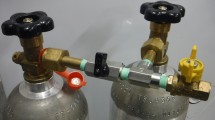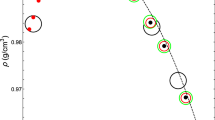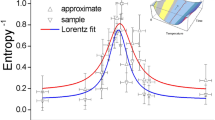Abstract
IT is possible to measure the specific heat of a liquid at a number of different temperatures by determining the power required to hold the temperature of a calorimeter and its contents stationary at different temperatures above that of the surroundings. The power is supplied electrically to a coil immersed in the liquid, and we have If a cooling curve is now taken, it can be shown that within the limits of experimental error, where n is nearly, but not exactly, equal to 5/4, K and n being determined by the use of a least-square or some equivalent method. We thus have giving the specific heat s in terms of the 20° calorie, if an experiment be performed with water at 20° C.
This is a preview of subscription content, access via your institution
Access options
Subscribe to this journal
Receive 51 print issues and online access
$199.00 per year
only $3.90 per issue
Buy this article
- Purchase on Springer Link
- Instant access to full article PDF
Prices may be subject to local taxes which are calculated during checkout
Similar content being viewed by others
Author information
Authors and Affiliations
Rights and permissions
About this article
Cite this article
FERGUSON., A., COCKETT., A. Specific Heat of a Liquid at Different Temperatures. Nature 138, 842–843 (1936). https://doi.org/10.1038/138842b0
Issue Date:
DOI: https://doi.org/10.1038/138842b0
Comments
By submitting a comment you agree to abide by our Terms and Community Guidelines. If you find something abusive or that does not comply with our terms or guidelines please flag it as inappropriate.



